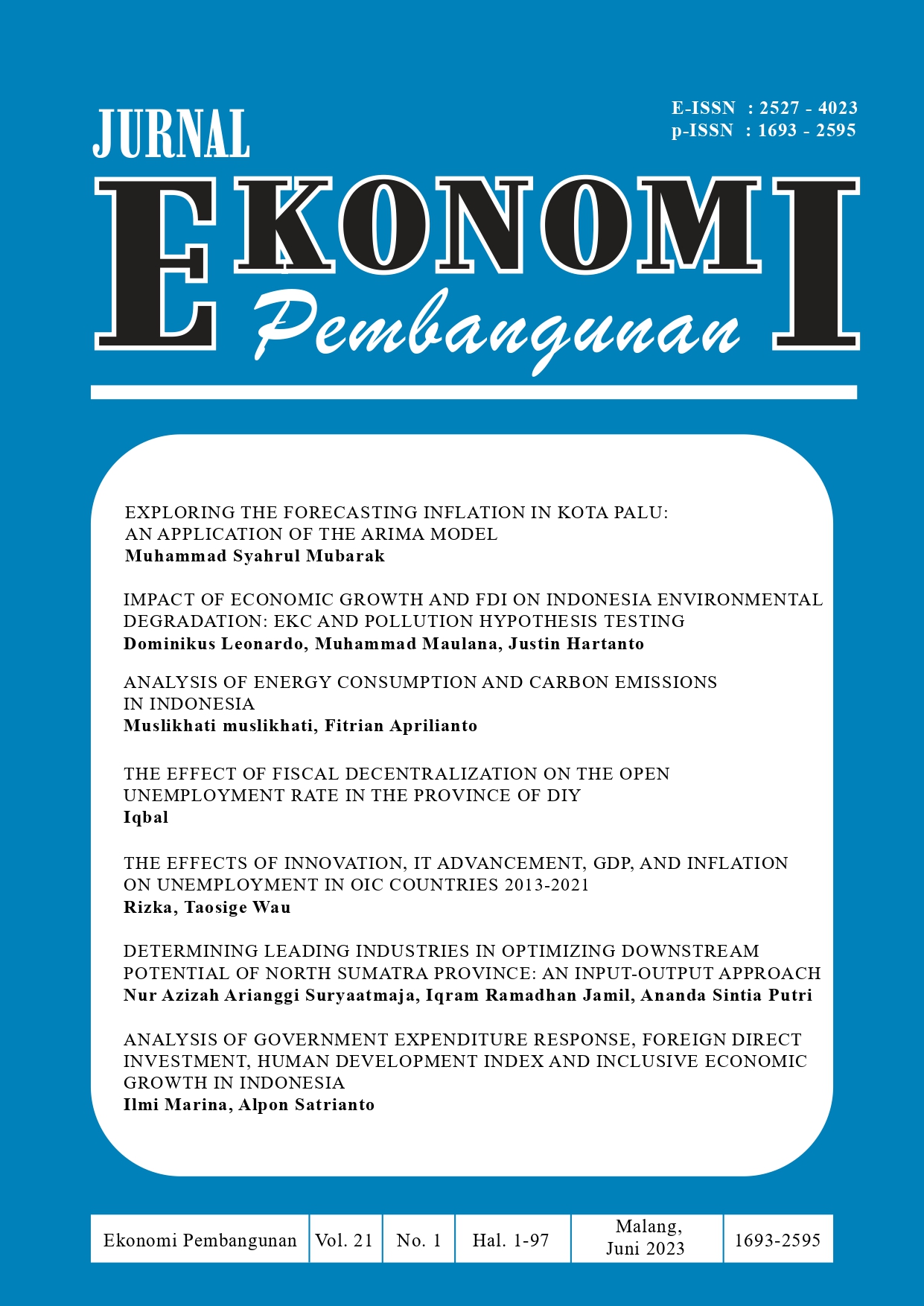Analysis of Government Expenditure Response, Foreign Direct Investment, Human Development Index and Inclusive Economic Growth in Indonesia
DOI:
https://doi.org/10.22219/jep.v21i01.25932Keywords:
Government Spending, Foreign Investment, Human Development Index, Inclusive Economic GrowthAbstract
This study aims to analyze the response to shocks that occur between the variables Government Expenditure, Foreign Investment, Human Development Index, and Inclusive Economic Growth. This type of research is descriptive and inductive. The data used are panel data for 34 provinces in Indonesia from 2012-2020, data obtained from related agencies. The analysis method used is the Panel Vector Error Correction Model (PVECM). The results of this study show that: (1) The response to government expenditure in the education function due to the shock of inclusive economic growth is positive, (2) The response to government expenditure in the health function due to the shock of inclusive economic growth is positive (3) The response to government expenditure in the economic function due to the shock of inclusive economic growth is negative (4) The response of foreign investment due to the shock of inclusive economic growth is negative (5) The response of the human development index due to the presence of Shock of Inclusive Economic Growth Is Positive.
Downloads
References
Adinda Putri Hapsari. (2018). Analisis Faktor-faktor yang Mempengaruhi Pertumbuhan Ekonomi Provinsi Jawa Tengah Periode 2010-2014. Universitas Diponegoro.
Amri, K., & Nazamuddin. (2018). Is There Causality Relationship Between Export and Employment : A Time Series Data Evidence From Indonesia? International Journal Of Academic Research in Economics and Management Sciences, 7(2), 86–9.
Badan Pusat Statistik. (2018). Indeks Pembangunan Manusia 2018. Badan Pusat Statistik.
Bappenas. (2018). Pembangunan Ekonomi Inklusif.
Fitrianasari, R. N. (2021). Analysis The Impact of Globalization, Fiscal Policy, and Human Capital on Inclusive Economic Growth : A Case Study on Panel Data 9 Districts in East Kalimantan Province. Buletin Statisitika Dan Aplikasi Terkini, 1(2), 29–38.
Maryam, S., & Irwan, M. (2022). Indeks Pembangunan/Pertumuhan Ekonomi Inklusif dan Indeks Pembangunan Manusia (IPM) di Nusa Tenggara Barat. Ekonomi Pembangunan.
Meilissa Ike Dien Safitri, Ananda, C. F., & Prasetyia, F. (2021). Analisis Dampak Belanja Pemerintah Daerah Terhadap Pertumbuhan Ekonomi Inklusif Jawa Timur. Perbendaharaan, Keuangan Negara, Dan Kebijakan Publik.
Ranieri, R., & Ramos, R. A. (2013). Inclusive Growth: Building up a Concept. 104, 1–21. www.ipc-undp.org
Rizky, R. L., Agustin, G., & Mukhlis, I. (2016). Pengaruh Penanaman Modal Asing, Penanaman Modal Dalam Negeri Dan Belanja Modal Terhadap Pertumbuhan Ekonomi Provinsi Di Indonesia. Jurnal Ekonomi Fakultas Ekonomi Universitas Negeri Malang, 8.
Singosari, C. W. (2017). Analisis Peran Pemerintah dalam Mewujudkan Pertumbuhan Inklusif di Jawa Timur. Jurnal Ilmiah Mahasiswa Fakultas Ekonomi Dan Bisnis Universitas Brawijaya, 5(2).
Subandi. (2016). Ekonomi Pembangunan. Alfabeta.
Yanti, A. V., & Arsani, A. M. (2018). Komparasi Pertumbuhan Ekonomi Inklusif Di 33 Provinsi Indonesia Tahun 2010- 2015: Studi Kasus Menggunakan Metode Pendekatan ADB, WEF, DAN UNDP.
Downloads
Published
Issue
Section
License
Copyright (c) 2023 Ilmi Marina, Alpon Satrianto

This work is licensed under a Creative Commons Attribution-NonCommercial-ShareAlike 4.0 International License.
Authors who publish with Jurnal Ekonomi Pembangunan (JEP) agree to the following terms:
- For all articles published in Jurnal Ekonomi Pembangunan (JEP), copyright is retained by the authors. Authors permit the publisher to announce the work with conditions. When the manuscript is accepted for publication, the authors agree to the publishing right's automatic transfer to the publisher.
- Authors retain copyright and grant the journal right of first publication with the work simultaneously licensed under a Creative Commons Attribution-NonCommercial-ShareAlike 4.0 International License that allows others to share the work with an acknowledgment of the work's authorship and initial publication in this journal.
- Authors can enter into separate, additional contractual arrangements for the non-exclusive distribution of the journal's published version of the work (e.g., post it to an institutional repository or publish it in a book), with an acknowledgment of its initial publication in this journal.
- Authors are permitted and encouraged to post their work online (e.g., in institutional repositories or on their website) before and during the submission process, as it can lead to productive exchanges and earlier and greater citation of published work (See The Effect of Open Access).

This work is licensed under a Creative Commons Attribution-NonCommercial-ShareAlike 4.0 International License.






















